Climate.
On one of many sun-drenched days I found myself driving along the coast of the Grand Harbour. The historic bastions of Valletta cast their golden hues onto the blue waters of the Mediterranean Sea, creating a breath-taking view. As I admired the scenery, my gaze was drawn to a superyacht anchored nearby. While such a sight is not uncommon for our scenic harbour, what got my attention was the two refueler trucks parked alongside it.
I slowed down to catch a closer glimpse of the vessel. To my surprise, I noticed that the yacht was owned by the royal family of one of the Gulf states, where vast oil reserves seemed as abundant as the sands of the desert. Yet, here they were in Malta, getting their yacht refuelled. Fuel in Malta was being generously subsidized at the time after oil prices had surged in 2020. This made Malta an irresistible destination for super-yacht owners seeking cost-effective refuelling. Even the wealthiest of the wealthy couldn't resist a good deal.
A few weeks later, the Maltese government, embarrassed by such stories, released an announcement excluding superyachts from fuel subsidies. Nevertheless, electricity generated from burning fossil fuels as well as fuel at gas stations would still be subsidised for the general population. In fact, in the budget presented to parliament on the 30th of October 2023, €4.90 out of every €100 allocated by the government would be dedicated to maintaining stable electricity and fuel prices in 2024.
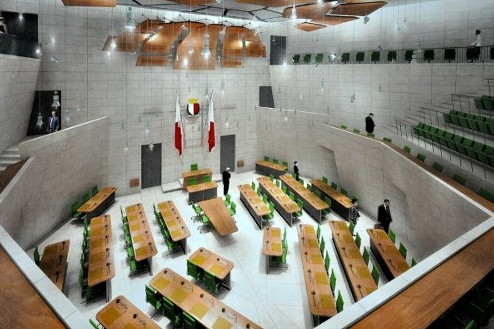
Despite its small size and minimal carbon footprint, Malta, having one of the lowest per capita greenhouse gas emissions in the European Union, may find that its policies are contributing to an increase in CO2 emissions within the small island nation.
Fuel subsidies offer a welcome relief to the population, who are already contending with the ever-rising cost of living. However, as increased government spending adds to the national debt, one might rightfully question the financial sustainability of these subsidies and, even more critically, their environmental sustainability. Regrettably, the subsidised fuel prices not only help modest families afford their daily commute and heating their homes during the winter, but they also benefit the more affluent in keeping their swimming pools warm and refuelling their boats and luxury cars.
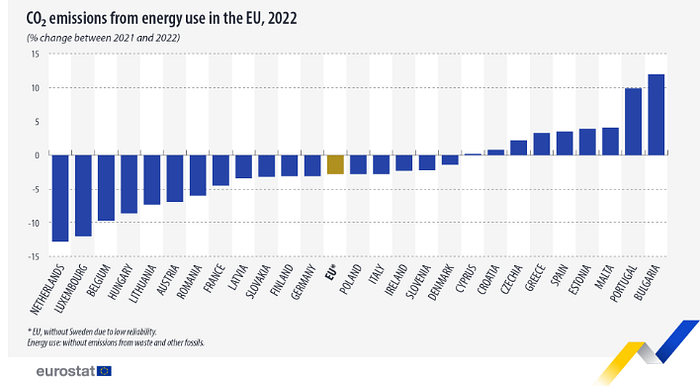
Malta isn't alone; global fuel subsidies reached 7 trillion dollars in 2022. That's trillion, with a 'T.' This surge was primarily driven by the economic recovery from the COVID-19 pandemic and the energy price spike resulting from Russia's invasion of Ukraine. Despite the urgent need to combat climate change, these subsidies, equivalent to 7.1% of the global GDP, have significant economic and environmental consequences. They surpass annual spending on education and make up a substantial portion of healthcare expenses.
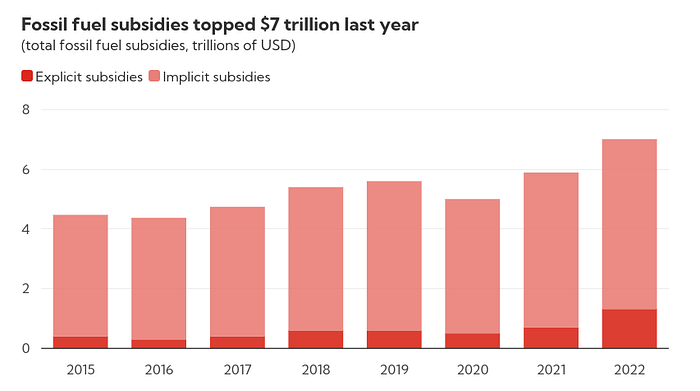
Even within the European Union, which has made a firm commitment to reduce its greenhouse gas emissions by at least 55% compared to 1990 levels by 2030 and achieve climate neutrality by 2050, fuel subsidies are not decreasing. As previously mentioned, in many countries, like Malta, fuel subsidies are actually on the rise.
In alignment with international obligations, such as those outlined in the G20 Pittsburgh Summit and the COP26 Glasgow Climate Pact, as well as the European Green Deal, the European Union's Eighth Environment Action Programme advocates for an immediate halt to subsidies directed towards fossil fuels, including coal, gas, and oil. The European Commission's State of the Energy Union report closely monitors the progress in this regard.
Nonetheless, subsidies for fossil fuels remained consistent, hovering around approximately 52 billion euros between 2015 and 2021. The increase of 5 billion euros from 2015 to 2018 can primarily be attributed to higher subsidies in the transportation sector. The decrease of 1 billion euros from 2018 to 2019 is mainly due to reductions in the energy and industrial sectors. A significant reduction of 2 billion euros from 2019 to 2020 was a result of decreased transportation activities stemming from lockdown measures during the COVID-19 pandemic.
This downward trend was disrupted in 2022 due to the European response to the energy crisis, primarily caused by the war in Ukraine. Subsidy measures became one of the primary instruments for mitigating the impact of high energy prices on the cost of living and the production costs of European industries.
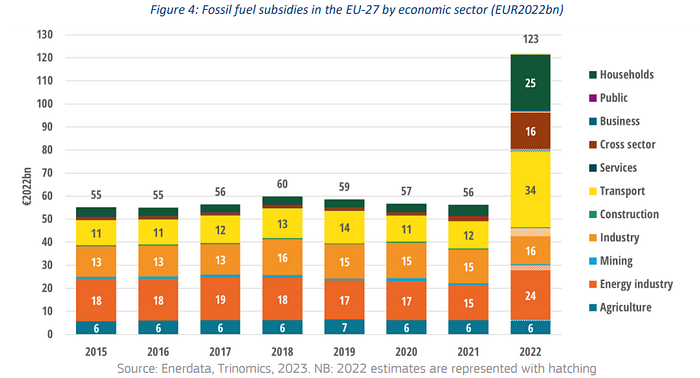
As a result, fossil fuel subsidies are estimated to have more than doubled between 2021 and 2022, soaring from 56 billion euros to 123 billion euros. This increase can be attributed to several factors, including a significant rise in support for households, as well as increased subsidies for the transportation sector and the energy industry. However, it's worth noting that, despite the substantial increase in fossil fuel subsidies in 2022 compared to 2021, primarily in response to the energy crisis, the majority of these measures are temporary and have expiration dates in the near future. Therefore, it is unlikely that the rise in subsidies of 2022 with last.
Member states are obligated to include details on the reduction of energy subsidies, particularly those linked to fossil fuels, in their annual national energy and climate progress reports. Based on the information provided in these reports, many nations express a desire to transition away from reliance on fossil fuels. However, only a select few, namely Denmark, Germany, Ireland, Italy, and Sweden, have taken concrete steps to enact laws or establish clear plans outlining specific timelines for phasing out fossil fuel subsidies.
The failure to phase out fossil fuel subsidies extends beyond the borders of the European Union. The contradiction between the G20 nations' commitment in 2009 to phase out "inefficient" fossil fuel subsidies and their record-breaking injection of $1.4 trillion into such subsidies in 2022, as estimated by the International Institute for Sustainable Development think tank, is striking. This alarming figure is further exacerbated by the World Bank's revelation that the combination of fossil fuel and agricultural subsidies globally could reach a staggering $12 trillion annually, contributing significantly to environmental damage.
The International Energy Agency (IEA) has been a vocal advocate for reducing or eliminating fossil fuel subsidies for several compelling reasons. These subsidies not only distort market dynamics but also send misleading price signals to consumers, worsen fiscal deficits in developing economies, and discourage the transition to cleaner, renewable energy sources. The necessity for subsidy reform becomes especially critical at a time when our focus should be on reducing wasteful consumption and expediting the adoption of clean energy alternatives. While it undoubtedly presents a formidable political challenge, it is equally essential both from an economic and environmental standpoint.
The IMF estimates that the elimination of fossil fuel subsidies could have far-reaching benefits, including the prevention of 1.6 million premature deaths annually, the generation of $4.4 trillion in government revenues, and significant contributions to achieving global climate goals. However, it is crucial that these reforms are thoughtfully crafted and effectively communicated as part of a comprehensive policy package that emphasizes the advantages. Some of the additional revenues should be allocated to assisting vulnerable households with increased energy costs, while the remainder can be used to reduce taxes on labour and investment, as well as fund essential public services like education, healthcare, and clean energy initiatives.
The urgency of phasing out fossil fuel subsidies cannot be overstated, especially as emissions continue to rise. Ending these subsidies should be at the forefront of climate action, as emphasized by the IMF, and has the potential to align the world with the goal of limiting global temperature increases to below 2 degrees Celsius.
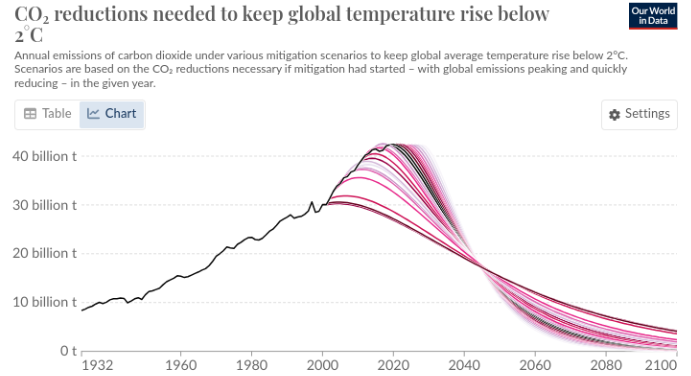
As we approach the opening ceremony of the COP28 summit taking place in the United Arab Emirates, ears should be tuned to listen for commitments to ending fuel subsidies. This small Gulf state heavily relies on fuel exports, and such commitments may run counter to the interests of many oil producers. After all, the CEO of the U.A.E.'s national oil company, Adnoc, has controversially been appointed as the president of the UN's COP28 summit. With CEO Sultan Al Jaber overseeing an expansion to produce oil and gas equivalent to 7.5 billion barrels of oil, there is reason to be sceptical. The scene I observed in Valletta — of superyachts being refuelling with subsidized diesel — should serve as a spectre to all.
If you found this article interesting, please feel free to subscribe: https://medium.com/@pedroborges01/subscribe
Source: Malta Today, Timesofmalta, European Commission, Eurostat, IMF, EEA, IEA, 2023 Report on Energy Subsidies in the EU, The Guardian, IISD, Our World in Data.


